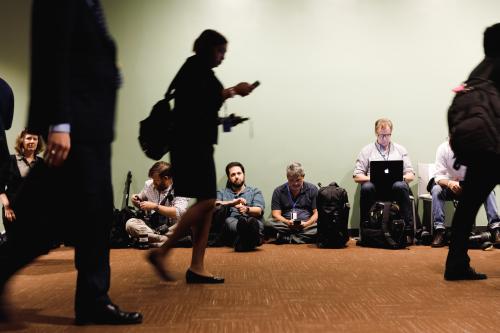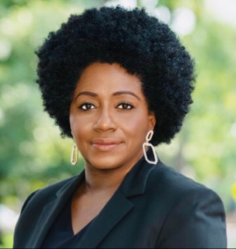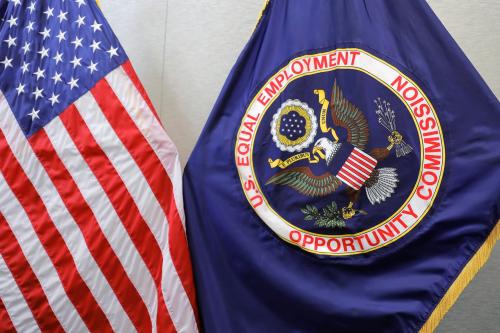In 2023, the New York Times published “Who’s Who Behind the Dawn of the Artificial Intelligence Movement,” pointing to many leaders of Big Tech companies, including Sam Altman, Elon Musk, and Satya Nadella—among other men. Women were glaringly omitted from the list of leading voices in AI. Despite their historic and significant contributions, they remain largely invisible on mainstream platforms, with their achievements often downplayed—particularly their roles in shaping the science and altering the course of technology.
In recognition of Women’s History Month, the Center for Technology Innovation desires to highlight the women who, to some, are hidden in this space, and deserve acknowledgement for how they are creating technical, research, and policy breakthroughs. These women were identified through a review of their public accomplishments, selected for their prominence outside the industry, and validated by others in the field. We categorize these leaders into three groups: AI Liberators, AI Griots, and AI Policy Influencers.
AI Liberators are the women working to craft new technical models and intellectual frameworks to understand how to harness AI for public good. They cultivate more meaningful autonomous products and representative communities of experts like themselves.
The AI Griots carry on the tradition of storytelling by leveraging their research and policy expertise to create narratives of AI use along a continuum of use cases, including AI use by global majority countries or the linguistic nuances in large language models (LLMs).
The AI Policy Influencers are those who understand the translation of AI opportunities and benefits into legible policy and programmatic opportunities that serve to democratize its use.
Why women need to be (un)Hidden in AI
In 2016, a brilliant book titled “Hidden Figures” revealed that three African American mathematicians—Katherine Johnson, Dorothy Vaughan, and Mary Jackson—were the experts behind retired astronaut John Glenn’s orbital launch into space. Author Margot Lee Shetterly went into detail in her best-selling book to share how these women crafted the most accurate computational models to avert any potential disasters in space, making these missions an integral part of American history. When the book was released, Johnson was 96 years old. She later passed away at 101, just as the world was newly recognizing her extraordinary talents. Last year, her colleagues were formally recognized by the White House for their accomplishments and the pivotal roles that they, too, played at NASA.
Many women walk with the same charisma, talent, and confidence as Johnson and her peers. They play a pivotal role in shaping conversations that now fuel debates over what constitutes responsible, trustworthy, and inclusive artificial intelligence. These women, featured on our inaugural (un)Hidden Figures list, are the AI Equity Lab’s first—but not last—effort to highlight their contributions, particularly as leaders advancing bias identification and mitigation, linguistic diversity in large language models, auditing and accountability in frontier AI models, and the use of AI across various contexts, including the workplace, workforce, community, health, and education.
The women being recognized are not just “(un)hidden”—they are essential to ensuring AI thrives without disregarding humanity or the fundamental civil and human rights it upholds. Join us in celebrating and amplifying the voices of these extraordinary women leaders in AI.
AI Liberators
Nora Benavidez
Senior Counsel and Director of Digital Justice and Civil Rights, Free Press
An expert at the intersection of law and technology, Benavidez has spearheaded initiatives to combat disinformation, safeguard civil rights online, and champion free expression. Throughout her career, she has litigated landmark cases and authored influential reports shaping the role of tech companies and social media platforms in our democracy.
Ruha Benjamin
Professor of African American Studies, Princeton University; Founding Director, Ida B. Wells JUST Data Lab
Benjamin is a sociologist, author, MacArthur Genius recipient, and a leading voice at the intersection of equity, medicine, and technology. Through the JUST Data Lab, she convenes activists, students, educators, and artists to explore and amplify the connection between technology and justice.
Joy Buolamwini
Founder, Algorithmic Justice League
Buolamwini blends art and research to advocate for more equitable technology. Her work has not only exposed biases in artificial intelligence but also illuminated its broader social implications, sparking ongoing conversations about these harms. Through her contributions—ranging from academic papers and art installations to testimony in the halls of Congress—she has been recognized as “the conscience of the AI revolution.”
Renée Cummings
Nonresident Senior Fellow, Brookings; Assistant Professor of Practice in Data Science, University of Virginia
Cummings is the first data activist-in-residence at the University of Virginia’s School of Data Science, where she reimagines the relationship between data and society. Her research advances the development of AI that benefits all, with a steadfast focus on justice and inclusivity.
Avriel Epps
Civic Science Postdoctoral Fellow, Cornell University CATLab; Co-founder, AI4Abolition
As a computational social scientist, Epps has advanced our understanding of the effects of bias in predictive technologies and the impact of algorithm design. They lead AI4Abolition, building on this work to increase AI literacy among marginalized communities and foster collective power.
Timnit Gebru
Founder and Executive Director, Distributed AI Research Institute
Gebru is a leading voice in reshaping AI to ensure it works for everyone. After raising concerns about fairness, she founded her own organization to advocate for AI justice, ensuring that new technologies reflect the lived experiences of all communities.
Susan Gonzales
Founder and CEO, AIandYou
A former policy executive for tech and telecom companies, Gonzales leveraged her extensive experience in technology to launch AIandYou, a platform dedicated to educating the public on the opportunities and challenges of AI. Her work has influenced numerous organizations and guidelines, including the National AI Initiative under former President Biden.
Safiya Noble
David O. Sears Presidential Endowed Chair in the Division of Social Sciences and Professor of African American Studies, Gender Studies, and Information Studies, UCLA
Noble is a best-selling author, researcher, MacArthur Genius recipient, and expert at the intersection of technology, identity, and power. Whether at UCLA or as a research associate at the Oxford Internet Institute, her work consistently exposes the biases embedded in everyday technology and educates audiences through a wide range of publications.
Cathy O’Neil
CEO, O’Neil Risk Consulting and Algorithmic Auditing
A mathematician and data scientist, O’Neil is renowned for her work in algorithmic auditing and for coining the term “weapons of math destruction” to highlight the agendas behind mathematical formulas. An author of two books and a member of the Public Interest Tech Lab at the Harvard Kennedy School, her work continues to shed light on the realities and inequalities embedded in technology.
Sneha Revanur
Founder and President, Encode Justice
Revanur began advocating for equitable AI in high school, founding Encode Justice—an organization that shapes policy and mobilizes students nationwide. Her work has been featured in numerous publications, at the World Economic Forum, and in a roundtable at the White House.
Mia Shah-Dand
Founder and CEO, Lighthouse3
Shah-Dand is a leader in responsible AI, guiding the ethical adoption of technologies while spotlighting other pioneers in the field. Through the distinguished Women in AI Ethics’ List of 100 Brilliant Women, she works to center and recognize women in tech, ensuring that no perspectives or contributions are overlooked.
Nicol Turner Lee
Senior Fellow and Director of the Center for Technology Innovation, The Brookings Institution
Turner Lee is a writer, researcher, and storyteller dedicated to advancing equitable access to new technology. Her work focuses on communities and institutions that are often underrepresented in technology discussions, exemplified by her founding of the AI Equity Lab at Brookings.
Miriam Vogel
President and CEO, EqualAI
Vogel has informed best practices in AI governance across industries, sharing her knowledge with lawmakers, in classrooms and C-suites, and on her own podcast. Through EqualAI, she uses her expertise to ensure AI advances our quality of life without perpetuating harm.
s
s
AI Griots
Emily Bender
Thomas L. and Margo G. Wyckoff Endowed Professor, University of Washington
A computational linguist, Bender examines the societal impacts of AI-driven language technologies. Through her work in multilingual grammar engineering and natural language processing ethics, she advocates for responsible AI development and critically analyzes the biases and limitations of large language models. She was formerly chair of the Executive Board of the Nations of the Americas Chapter of the Association for Computational Linguistics.
Afua Bruce
Adjunct Professor, Carnegie Mellon University; Founder, ANB Advisory Group LLC
A leading public interest technologist, Bruce curates research and community-centered innovation at the intersection of technology, policy, and society. She is widely recognized through her work at DataKind, New America, the White House, and her consulting firm ANB Advisory Group, where she champions responsible AI and equitable technology deployment.
Aylin Caliskan
Nonresident Fellow, Brookings Institution; Assistant Professor, University of Washington; Co-Director, Tech Policy Lab
Caliskan researches the societal impact of AI, focusing on fairness in natural language processing, multimodal machine learning, and human-AI collaboration. Her work was one of the first to rigorously show that natural language models contain human-like biases and has been recognized with the Frontiers of Science Award.
Fay Cobb Payton
Director of the Institute for Data, Research and Innovation Science, Rutgers University–Newark
Payton researches the intersection of technology, innovation and data biases, focusing on the STEM ecosystem groups in STEM, health care and tech enabled environments. A leader in interdisciplinary research and tech policy, she advocates for diversity in the industry and explores the societal impacts of data and analytics.
April Dawson
Associate Dean of Technology and Innovation & Professor of Law, North Carolina Central University
A leading expert on technology in legal education, Dawson explores the intersection of AI, law, and policy. She oversees North Carolina Central University’s Technology Law and Policy Center and is an author who helps shape conversations on AI’s role in legal academia and practice.
Jedidah Isler
Chief Science Officer, Federation of American Scientists
Isler bridges science, technology, and policy to drive inclusive innovation. As the Federation of American Scientists’ first Chief Science Officer and a former White House Office of Science and Technology Policy leader, she champions equitable STEM engagement, ensuring science informs effective public policy.
Chijioke Okorie
Founder and Leader, Data Science Law Lab
Okorie explores the intersection of law, data science, and AI policy across the African continent. As the leader of the Data Science Law Lab, she provides research-driven policy insights on intellectual property and information justice, shaping legal frameworks for emerging technologies.
Deborah Raji
Fellow, Mozilla Foundation; Researcher, UC Berkeley
Raji researches algorithmic auditing and AI evaluation, exposing bias in deployed AI systems. Through her work with the Algorithmic Justice League, Google’s Ethical AI team, and the Partnership on AI, she advances methods to integrate ethical considerations into machine learning development.
Erin Reddick
AI Developer and Founder, ChatBlackGPT
Reddick is the creator of ChatBlackGPT, a software that provides perspectives from Black and African American communities. This commitment to inclusivity in technology has spanned her entire career, and this dedication has helped diversify AI and craft more equitable spaces in tech.
Latanya Sweeney
Daniel Paul Professor of the Practice of Government and Technology, Harvard Kennedy School; Founder, Public Interest Tech Lab
A pioneer in data privacy and algorithmic fairness, Sweeney applies technology to solve societal challenges. She has shaped U.S. privacy regulations, led research on election security and social media analysis, and advanced public interest technology to bridge governance and AI ethics. She has served as a Chief Technology Officer at the Federal Trade Commission, which relied heavily on her work for consumer protection.
Fallon Wilson
Co-Founder and Lead Principal Investigator, #BlackTechFutures Research Institute; Vice President of Policy, Multicultural Media, Telecom, and Internet Council
Wilson researches and advocates for sustainable Black tech ecosystems, focusing on digital equity and inclusion. Through her leadership at #BlackTechFutures and the Multicultural Media, Telecom and Internet Council, she advances policy solutions to close the digital divide and expand opportunities in underrepresented communities.
Adrienne Williams
Research Fellow, Distributed AI Research Institute
Williams works with activists, politicians, and researchers to effect change with technologies, especially within labor and education. Her work at the Distributed AI Research Institute, with the OpEd Project, and at Just Tech has helped educate the public on harms within the field and give guidance on how to mitigate them.
AI Policy Influencers
Rumman Chowdhury
CEO and Co-Founder, Humane Intelligence; Responsible AI Fellow, Berkman Klein Center for Internet and Society at Harvard University
With expertise at the intersection of artificial intelligence and humanity, Chowdhury has been a major force in mitigating algorithmic harms. Her work at U.S. companies has had lasting influence, but her engagements with the U.K. Center for Data Ethics and Innovation and UNESCO’s Broadband Commission for Sustainable Development show the importance of her perspective internationally.
Danielle Davis
Director of Technology Policy, Joint Center for Political and Economic Studies
Davis leads work on broadband adoption and access, content moderation, and privacy issues at the Joint Center for Political and Economic Studies. Previously contributing to this work as policy counsel at several organizations, her projects continue to show her dedication to advancing technology and telecom policy.
Rebecca Finlay
CEO, Partnership on AI
Finlay is a trusted leader at the center of technology and society, with experience leading organizations that prioritize positive outcomes in AI development. She led one of the first international initiatives with this goal and has been a strong voice in a variety of publications and advisory bodies.
Sorelle Friedler
Nonresident Senior Fellow, Brookings Institution; Shibulal Family Professor of Computer Science, Haverford College
A computer science professor at Haverford College, Friedler researches the fairness interpretability of machine learning algorithms, with broad applications spanning criminal justice and materials discovery. She formerly served as the Assistant Director for Data and Democracy within the Biden administration, where she contributed to protecting civil rights through the AI Bill of Rights.
Alondra Nelson
Chair, Science, Technology, and Social Values Lab at the Institute for Advanced Study
Nelson works in the intersection of racial formation, social citizenship, and emerging technological phenomena. She served as the deputy assistant to former President Joe Biden and in directorial roles at the White House Office of Science and Technology Policy. Her distinguished scholarship and leadership in the field of AI is recognized by Nature, TIME, and the United Nations.
Mutale Nkonde
CEO, AI for the People
Leading AI for the People, Nkonde works toward responsible approaches to the design, deployment, and governance of AI products. She was the lead advocate for the introduction of the Algorithmic Accountability Act and made significant contributions to a series of White House roundtables on AI under the Biden administration.
Chinasa T. Okolo
Fellow, Governance Studies, Center for Technology Innovation, Brookings Institution
Okolo is a distinguished Brookings fellow investigating effective AI and data governance approaches in Africa and the impact of generative AI on the Global Minority. Her work has been published in top-tier venues, and her contributions to global AI governance led to her recognition on the inaugural Forbes 30 under 30 AI list.
Courtney Radsch
Nonresident Fellow, Brookings Institution; Director, Center for Journalism and Liberty
Serving as the director of the Center for Journalism and Liberty at the Open Markets Institute, Radsch is a global thought leader on the political economy of AI and designing policy solutions that protect democracy and human liberty. She works to transform research and ideas into action that advances technology and rights.
Adwoa Rey
President and CEO, Women of Praize
Rey is the leader of Women of Praize, an organization providing spiritual support to women of color in politics. She has worked to advance policy education and advocacy training to faith communities and served on Capitol Hill, including as special assistant to the Vice Chair of the House Democratic Caucus.
Elham Tabassi
Director of Artificial Intelligence and Emerging Technology Initiative, Brookings Institution
Tabassi is the director of the Artificial Intelligence & Emerging Technology Initiative at Brookings following a distinguished career at the National Institute for Standards and Technology. She is the lead author of the widely adopted AI Risk Management framework and has deep expertise working among policymakers, researchers, and AI developers. For her scholarship and leadership in AI governance, she was named one of TIME’s 100 most influential people in AI.
Valerie Wirtschafter
Fellow, Foreign Policy, Artificial Intelligence and Emerging Technology Initiative, Brookings Institution
Wirtschafter researches democratic resilience, democratic erosion, artificial intelligence, and technology utilizing novel data-driving strategies. She co-led the development of provisional principles for the use of generative AI at Brookings, which has helped set the standard across think tanks.
Baobao Zhang
Maxwell Dean Assistant Professor of the Politics of AI, Syracuse University
Zhang is an expert in AI governance and trust in digital technologies who is co-editing the “Oxford Handbook of AI Governance.” Her previous research has supported a broad range of topics, spanning from the American welfare state to attitudes toward climate change, now sharing her expertise in a variety of classes at Syracuse University.
The Brookings Institution is committed to quality, independence, and impact.
We are supported by a diverse array of funders. In line with our values and policies, each Brookings publication represents the sole views of its author(s).








Commentary
Recognizing the (un)Hidden Figures in AI
March 31, 2025